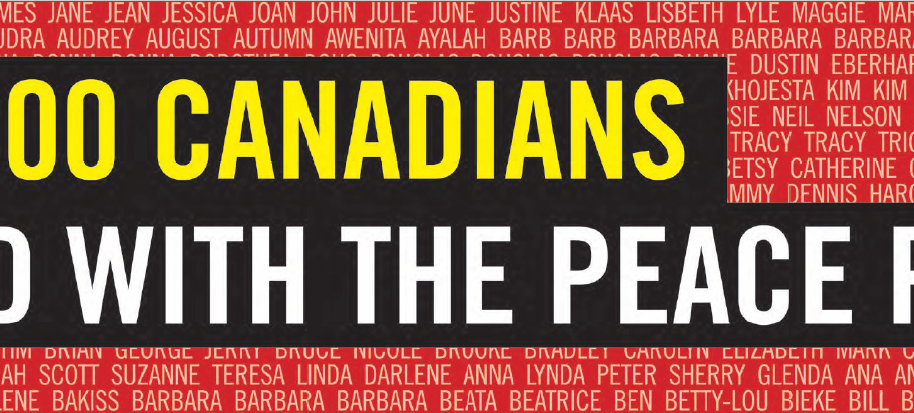Citizens’ groups, Indigenous peoples, human rights and environmental organizations are asking British Columbia MPs to take a message to Ottawa.
“British Columbia’s Site C dam is one of the largest megaprojects of our generation,” said Andrea Morison, Executive Director of the Peace Valley Environment Association. “Our political leaders cannot continue to ignore the devastating impacts it will have on our waters and on the rights of Indigenous peoples.”
More than 120,000 people have signed petitions, postcards and letters calling for an immediate halt to construction. Petitions were presented to BC MPs today as they prepared to return to the House of Commons after a Parliamentary break.
Organizers included Amnesty International Canada, Leadnow, Sierra Club BC, the Peace Valley Environment Association, KAIROS, Keepers of the Water, Peace Valley Landowners Association, Alliance4Democracy and the Yellowstone to Yukon Conservation Initiative.
They are calling on parliamentarians of all parties to press for clear answers as to why the Site C dam is still going ahead despite established harm to the natural environment, farmlands, and the rights of Indigenous peoples.
Last week, a detailed study published by the University of British Columbia Program on Water Governance concluded that proceeding with Site C would be “uneconomic”, since future electricity demand will be much lower than BC Hydro had stated during the review process, the cost of the project will be higher than previously estimated, and the cost of alternative sources of energy would be lower.
Candace Batycki of the Yellowstone to Yukon Conservation Initiative said, “Even before Site C was approved, the environmental assessment process raised serious doubts about the claimed economic benefits that supposedly justified the terrible harm that would be done by flooding the Peace Valley. Now that this report from UBC has declared Site C uneconomic, it’s clearly time for both levels of government to give this project some sober second thought.”
The federal government has acknowledged that it approved the Site C dam without consideration of whether doing so was consistent with their legal obligations under Treaty 8, which protects the right of the Cree and Dane-Zaa to use their traditional lands. Despite a series of judicial reviews of the approval of Site C, Canadian courts have yet to render a verdict on this fundamental question.
“Site C is a disaster in the making,” said Brittany Smith, campaigner at Leadnow. “Canadians deserve to know why our governments have continued to back such a harmful and costly project in the face of serious, unresolved legal challenges from First Nations.”
The Site C dam also seriously threatens water flows in the Peace-Athabasca Delta, part of Wood Buffalo National Park. A recent UNESCO report strongly criticized Canada for failing to protect the park. The country’s largest World Heritage Site risks being added to the List of World Heritage in Danger unless the Canadian government acts immediately to address these threats, which endanger the ability of the Mikisew Cree to practice their way of life.
“The UNESCO report shows the Site C dam should have never been approved in the first place. Now, it is damaging the relationship between First Nations and Canadian society,” said Galen Armstrong, Peace Valley Campaigner for Sierra Club BC. “It is time for the federal government to stop abdicating its responsibility and immediately suspend its approval of Site C.”
Grand Chief Stewart Phillip of the Union of British Columbia Indian Chiefs said, “The future of Site C has become a hot topic in the current provincial election. Whoever forms the next provincial government after May 9th, it is going to be very hard for them to continue ignoring the impact of this unnecessary megaproject. The missing piece is for the federal government to break its silence on this crucial issue.”
Jennifer Henry, Executive Director of KAIROS, said, “Our organizations are grateful to the Members of Parliament who have already spoken out on Site C. We hope that MPs of all parties will agree that a project that is of such concern to so many Canadians deserves closer scrutiny.”
This week at a United Nations meeting on the rights of Indigenous peoples, the federal Minister of Indigenous Affairs Carolyn Bennett once again repeated her government’s promise to fully uphold the rights of Indigenous peoples recognized in the UN Declaration on the Rights of Indigenous Peoples, including the right of Indigenous peoples to say no to unwanted development on their lands.
Craig Benjamin, who is attending the UN meeting on behalf of Amnesty International, said, “The federal government has never explained how it can reconcile its claims to champion the rights of Indigenous peoples on the world stage while turning its back on those same rights in the Peace Valley.”
+++++
For more information please contact Jacob Kuehn, Media Relations: jkuehn@amnesty.ca // 613-744-7667 x 236













